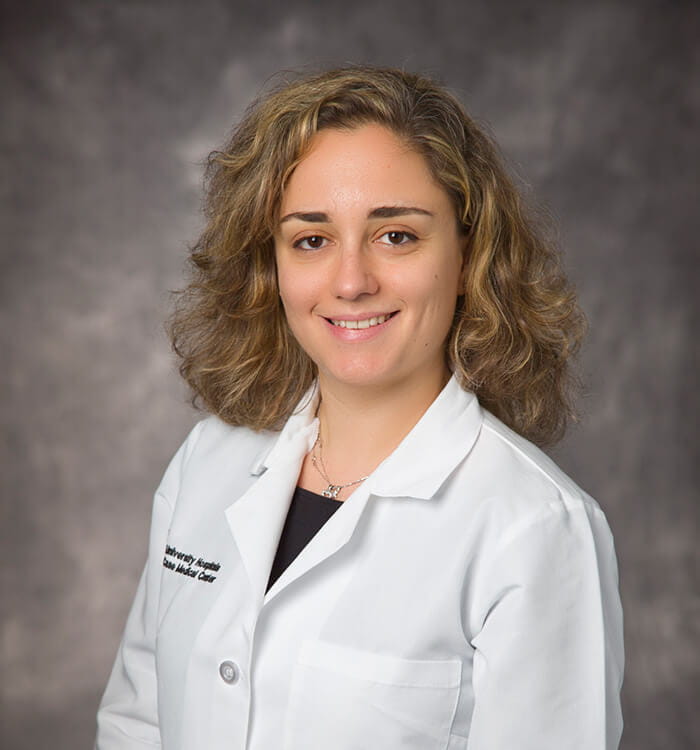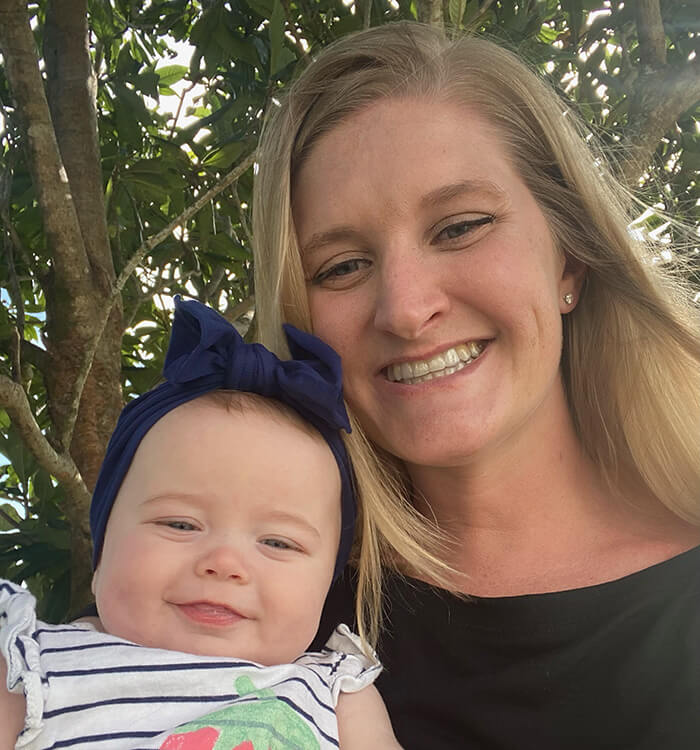University Hospitals First in Ohio to Enroll in a New NIH Clinical Trial of Treatment for Peripartum Cardiomyopathy
June 19, 2023
Innovations in Cardiovascular Medicine & Surgery | Summer 2023
Researchers at University Hospitals Heart & Vascular Institute were the first in Ohio to enroll a patient in a new clinical trial aimed at providing needed answers around the role of bromocriptine in the treatment of peripartum cardiomyopathy (PPCM).
 Chantal ElAmm, MD
Chantal ElAmm, MDDubbed REBIRTH (Randomized Evaluation of Bromocriptine In Myocardial Recovery Therapy), the new trial funded by the National Institutes of Health will randomize 200 women at approximately 60 centers across North America to either eight weeks of bromocriptine therapy or a placebo. The study will determine if bromocriptine therapy improves myocardial recovery and overall event-free survival for women with PPCM.
Women are eligible for the trial if they have a new diagnosis of PPCM, gave birth within the last five months, have a left ventricle ejection fraction (LVEF) value of 0.35 or lower and are age 18 or older. Women who want to breastfeed cannot take bromocriptine and cannot enroll in the REBIRTH trial. However, a cohort of up to 50 women excluded from REBIRTH due to a desire to breastfeed will be followed.
Previous trials of bromocriptine for PPCM have shown potential efficacy, but have not been definitive, says Chantal ElAmm, MD, heart failure specialist at University Hospitals Harrington Heart & Vascular Institute, who is leading the REBIRTH trial at UH.
“It was tested in locations other than the United States, such as South Africa and Europe,” she says. “The previous studies were smaller and suggest potential efficacy of bromocriptine, which if confirmed definitively, would have a significant impact on maternal mortality. This is why the NIH is now sponsoring this trial to see if it is beneficial for our patient population here in North America.”
This North American study is also important given the widely varying incidence of PPCM around the world. In Haiti, for example, Dr. ElAmm says, rates of PPCM are at one in every 300 deliveries, compared with the United States, where rates are 1 in 2,000.
Mechanism of Action
One theory behind the development of PPCM – and the potential of bromocriptine -- points to the role of the hormone prolactin, Dr. ElAmm says. Prolactin increases during pregnancy, enabling breastfeeding. Research shows that in murine models of PPCM, a prolactin cleavage product called 16kDa is elevated and demonstrates pro-apoptotic and anti-angiogenic properties. Inhibiting prolactin with bromocriptine appears to rescue the cardiomyopathy phenotype.
Study Details
All women enrolled in REBIRTH will have an assessment of left ventricle ejection fraction (LVEF) by echocardiogram upon entry to the study and repeated at six and 12 months. Subject will also be followed for up to three years post-randomization to determine survival free from major events (death, durable LVAD implantation, cardiac transplantation), as well as survival free from heart failure hospitalization.
 A Rebirth for Mother of Four | Read more about UH patient Whitney Keller and her story at UH Science of Health blog.
A Rebirth for Mother of Four | Read more about UH patient Whitney Keller and her story at UH Science of Health blog.In addition, the REBIRTH team will conduct advanced imaging, getting assessments of global longitudinal strain (GLS) and heart remodeling through assessment of left ventricular volume.
Biomarkers will also be collected at different time points of follow up.
Dr. ElAmm says she’s hopeful about what the trial might show and looks forward to what the results will reveal.
“The majority of women with peripartum cardiomyopathy do recover, but a subset is left with heart failure or cardiomyopathy, and 5 to 10 percent of these women will die or require advanced therapies such a heart transplantation during the first year post-partum,” she says. “This only highlights the importance of conducting and encouraging enrollment into this very significant trial.”
For more information about the REBIRTH trial at UH Harrington Heart & Vascular Institute or to refer a patient, please call 216-844-3130.
Contributing Expert:
Chantal ElAmm, MD
Advanced Heart Failure and Transplant Cardiology Specialist
University Hospitals Harrington Heart & Vascular Institute
Associate Chief Medical Officer
University Hospitals Cleveland Medical Center
Associate Professor
Case Western Reserve University School of Medicine


